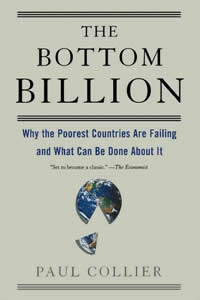 In his book “The Bottom Billion,” about the world’s poorest countries (which I reviewed earlier), Paul Collier writes:
In his book “The Bottom Billion,” about the world’s poorest countries (which I reviewed earlier), Paul Collier writes:
“Elections determine who is in power, but they do not determine how power is used.”
In our quest to spread democracy, we tend to place way too much emphasis on elections. Democracy involves a whole system of governance. Third World countries have learned how to hold elections, putting on a show for the world, without really instituting democracy.
Collier says studies show that in countries that successfully turned around, democracy and political rights were not important factors–a result he finds “extremely disappointing.” But results are results.
What’s really needed, he writes, is political checks and balances.
Without systemic checks and balances, tyrants can rule behind the facade of elections, cloaking themselves in an illusion of legitimacy. Like Hugo Chavez in Venezuela, or Ferdinand Marcos in the Philippines (RIP), or that idiot in Iran. Or maybe Hamid Karzai in Afghanistan? Collier says our enthusiasm for elections needs to be joined with enthusiasm for political restraints.
The US (and most western countries) have separate branches of government which provide checks and balances. But a legislature or judicial system can be co-opted by a totalitarian ruler. Collier cites a free media as the best form of checks and balances. Freedom of the press, which has characterized the US since our founding, is a key indicator of health. As much as we gripe about the media’s excesses and biases, it’s a crucial part of who we are. When you see a country where the media is free to criticize the government, it’s usually a sign of democratic health.





